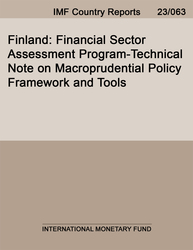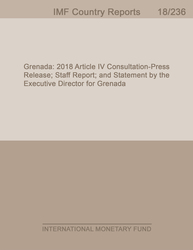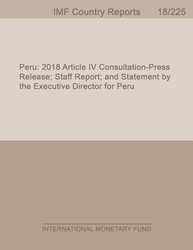
Finland: Financial Sector Assessment Program-Technical Note on Macroprudential Policy Framework and Tools
Finland: Financial Sector Assessment Program-Technical Note on Macroprudential Policy Framework and Tools
READ MORE...
Volume/Issue:
Volume 2023
Issue 063
Publication date: February 2023
ISBN: 9798400230547
$20.00
Add to Cart by clicking price of the language and format you'd like to purchase
Available Languages and Formats
| English |
Prices in red indicate formats that are not yet available but are forthcoming.
Topics covered in this book
This title contains information about the following subjects.
Click on a subject if you would like to see other titles with the same subjects.
Banks and Banking , Finance , Economics- Macroeconomics , Money and Monetary Policy , International - Economics , FSAP's finding , FIN-FSA staff , liquidity condition , Finland FSAP , MACROPRUDENTIAL POLICY FRAMEWORK , Macroprudential policy , Systemic risk assessment , Financial sector stability , Macroprudential policy instruments , Loans , Baltics , Global
Also of interest
Summary
This technical note highlights Macroprudential Policy Framework and Tools for the Finland Financial Sector Assessment Program. The institutional framework for macroprudential policy in Finland, formalized in 2014, is mostly in line with the IMF guidance for effective macroprudential policymaking. Systemic risk monitoring is well organized and conducted on a timely basis, especially in the household sector. The sustained increase in residential housing loans is of important systemic concern, and the authorities have taken measures to contain relevant risks. The ongoing development of Finland’s positive credit register will provide microdata on household indebtedness and income, which are useful to analyse vulnerabilities and to calibrate policy, and may be useful to authorities when considering the distributional consequences of macroprudential policies. Moreover, the analysis of corporate sector vulnerabilities should be as developed as that of household sector vulnerabilities, and it would be beneficial to address related data gaps.
Copyright © 2010 - 2026
Powered by:
AIDC



